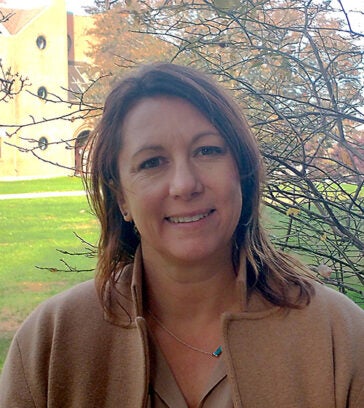Kristy Lewis, Assistant Professor of Oceanography
By Alexander Castro

Kristy Lewis’ latest title is “Assistant Professor of Oceanography.” Pretty straightforward, right? Lewis’ path to GSO, however, wasn’t so linear.
“I’ve lived like 15 lifetimes,” she says and laughs. “So it’s hard to put it all into one statement.”
Lewis spent childhood summers fishing in sunny Florida. Her post-college days found her in much chillier Alaska, doing data science alongside commercial fishers. She returned to her high school to teach science, all while pursuing a limited-residency Masters in Environmental Studies at Prescott College. To earn her Ph.D. at Louisiana State University, Lewis studied the impacts of habitat loss on food webs.
And then there’s the Lewis Lab, which strives to center “historically excluded perspectives” in the field of coastal ecology by uniting researchers from diverse backgrounds.
“I’m a queer woman in STEM fields, and inclusion and belonging is just a crux of who I am as a researcher, as a mentor, and as a teacher and as a professor,” Lewis says.
So it’d be fruitless to force Lewis’s colorful life experience into a rigid shape or outline—that would oppose the openness at the very center of her scientific ethos and practice. For Lewis, “transdisciplinary oceanography” is not only a methodology, but a way forward.
“Transdisciplinary science centers not only interdisciplinary work but it also centers the community, and other ways of knowing beyond western science,” Lewis says. It’s a comprehensive way of “thinking about how we can collaborate across difference and discipline to solve some of these wicked or complex problems in the coastal ocean.”
In Lewis’ case, the modeling she’s used throughout her career is put toward more applied ends in a transdisciplinary approach. It’s a philosophy that aims to be all-encompassing and precise, and it’s not for cookie-cutter thinkers—or the antisocial. Lewis notes that, when it comes to transdisciplinary research, “the biggest challenge is communication.”
Lewis’ example? “When you’re thinking about a problem like sea level rise or increasing ocean temperatures, we all know those things impact all of us,” she says. “[But] when you sit in a room with a social scientist, an engineer, and an archaeologist, and people with a whole different type of vocabulary…we generally don’t think about ‘How do we identify the problem and think about the solutions collectively?’ And a lot of people get turned away very quickly if you’re not truly trained and you’re not thoughtful.”’
That’s not even mentioning the other key aspect of transdisciplinary work—collaborating with communities to generate relevant and actionable research. Communities have often been an “afterthought” in western science, Lewis says. But imagine a park that frequently floods due to rising sea levels. How could an oceanographer, a landscape architect and an engineer redesign the park in a way that serves the community again?
At GSO, Lewis hopes to inspire students to understand and employ a transdisciplinary mindset that could solve such quagmires. As of this writing Lewis was unsure exactly which courses she’ll be teaching. Yet she’s definitely eager to design and teach a Grand Challenge course on transdisciplinary oceanography.
For Lewis, her latest local landscape is fortuitously compact: “We cannot address[…]horizontal problems with vertical solutions. We cannot be in a silo just studying biological oceanography,” she says. “That’s where the social science and the economic aspects come into play. Honestly, I can’t imagine a better place to do that kind of work than here in Rhode Island.”
And so begins another lifetime for Kristy Lewis.
